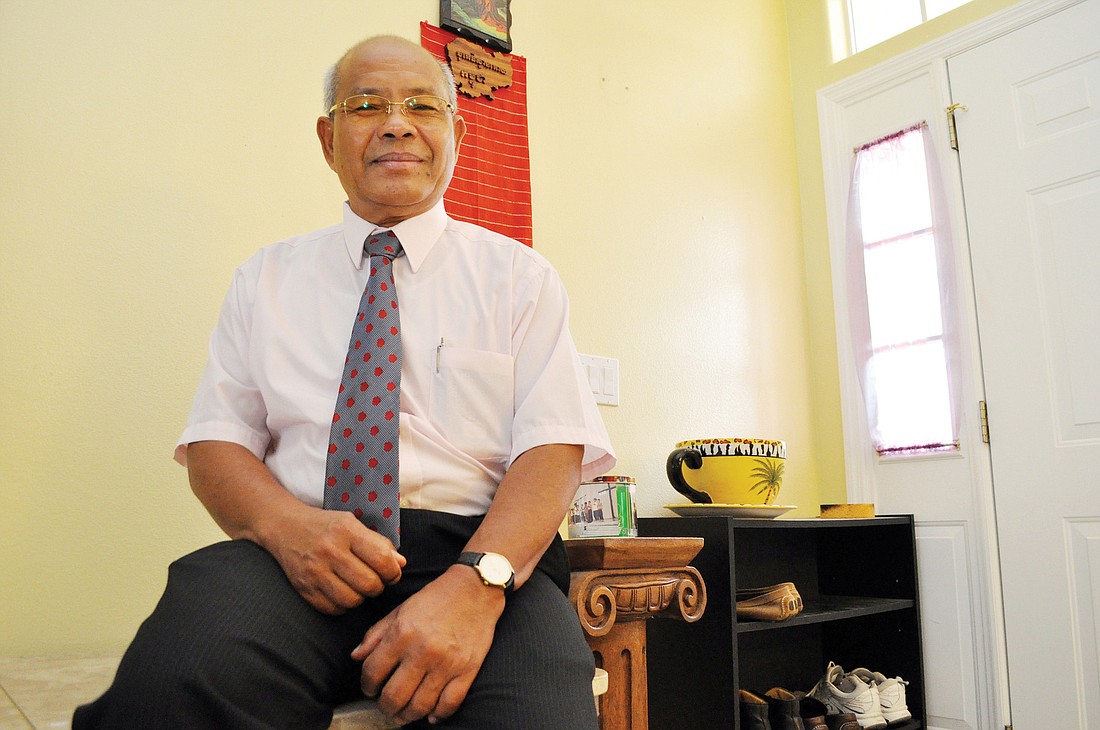- November 28, 2024
-
-
Loading

Loading

Cambodian immigrant and Palm Coast resident Chhon Kong has been a soldier, prisoner, pastor and insurance agent.
Loading an acoustic guitar into his car on his R-section driveway, 58-year-old Cambodian immigrant Chhon Kong heads toward Gamble Rogers State Park for a jam session, to sing and strum and play away his past.
But there was a time when release wasn’t so easy.
In the trenches with Americans
On Aug. 14, 1974, he watched American bombers flee overhead, withdrawing from the war-torn skies of his Cambodian homeland. He waved to them.
Bye-bye, he thought. You live. I die.
This, like most of Kong’s life, had seemed unfair. His country was divided between corrupt politicians and communist kings. His peasant mother, who sold an ox to pay for his education in the city instead of in communist training facilities, had been taken at gunpoint with the rest of her village to a labor camp. He never saw her again.
But that was typical, Kong says. Oppose the communist authority and you were killed.
A few months before graduating high school, he was dragged into the Cambodian Navy, where he eventually led companies and fought alongside Americans, in Vietnam.
He fought for two years on the front lines and underground in trenches.
“I took 81mm mortar grenades,” he explains, “tied them together in threes and stuff M-67 hand grenades inside.” He makes pinching, twisting and wrapping movements with his hands as he speaks, rattling off weapon names like other men do baseball players and their positions.
He says he can assemble most guns in the dark, without seeing their parts or where they go. He just knows.
“It was the most serious assault I ever got into,” he says, resting his hands into his lap and describing scaling steep inclines toward the tops of bunkers, opening manhole lids and dropping bomb cocktails inside. Then he’d let go, tumbling down the hill just in time to bundle more grenades, crawl back up and drop them down again.
It was the only way to do any real damage, he says: Kill more of them than they killed of you. It was the only way to stay alive.
After the war, he was arrested four, maybe five times — he can’t remember — and held in concentration camps, where he survived on pig’s food he stole and ate out of troughs with the rest of the swine. He was stricken with malaria.
Khmer Rouge
After the war, the Khmer Rouge ruled. Kong waded through the so-called Killing Fields, witnessing “hundreds and hundreds” of his people being shot by firing squad, then bulldozed into mass burial by government “butchers.”
“And then I rose against them,” he says.
He led a nine-month independent uprising, directing 600 men in guerilla-like attacks on his country’s oppressors. He did this with “no force, no ammunition, no food supply,” he says.
He still remembers — vividly — leading a unit of men into an assault on Khmer Rouge bunkers. It was 2 o’clock in the afternoon; air strikes and ship fire surrounded him. Before running out into the slaughter, he told his troops, “Kill or be killed.”
Escape to America
Eventually, Kong escaped to a United Nations refugee camp in Thailand, where he stayed for 22 months until being brought to Connecticut for resettling, in 1981.
“That part is past,” he said. “It is very, very difficult to look at it.”
In Connecticut, Kong was introduced to American life.
“I wore maternity clothes for so many months — it was so comfortable!” he laughed. To him, a shirt was a shirt; shoes were shoes. But soon he learned the culture.
As part of a church program, he became the pastor of a ministry. He raised leadership and organized two congregations, one in Bridgeport and another in Danbury.
Coming home
His friend prodded him to return to his homeland, but it was a terrifying prospect — Kong suffered from blackouts two to three times a day because of the memories.
Twelve years later he ventured back to Cambodia, to build monasteries on the very ground on which he grew up, fought and nearly died.
Over time, his mission made him feel as though, in some small way, he was setting things right.
It wasn’t healing, he says, but it was something.
Kong stayed in Cambodia for 17 years. He set up five churches there before moving back to the United States in 2010, and to Palm Coast for its temperate weather, which reminds him of back home.
But it also reminds him how far away he is from home, as he goes to work every day for an insurance company. His new vocabulary: dental and vision, instant Medicare supplements, fixed income annuities.
“Life has a purpose,” Kong says, which, simply, is to appreciate it, and to help people. “Hardship is a stepping stone to a better life … (It) has an end to it … You have to make it through.”
Making it through, for Kong, includes an acoustic guitar.
Salty air breezes in from the beach and Intracoastal, softening the sound of Kong’s strings. With a semicircle of onlookers at the second monthly Gamble Rogers Jam Session, he performs a Cambodian hymn, and his song adds color to the coastline.